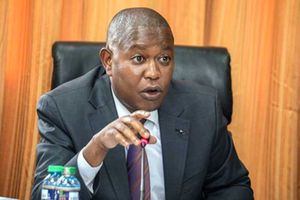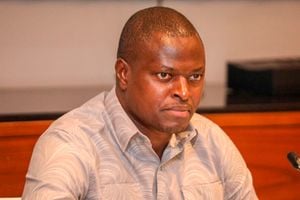
President William Ruto and his deputy Rigathi Gachagua.
The tabling of an impeachment motion against Deputy President Rigathi Gachagua on Monday, the first under the 2010 Constitution, marked the beginning of the end of his political marriage to his boss William Ruto after months of shadowboxing.
It had been preceded by quiet wars that at times saw Mr Gachagua avoid setting foot at State House, sometimes to the point of near physical brawls with operatives in the corridors of power, which the DP alluded to in his recent television interview. In the interview, he said a senior politician had confronted him at the airport and berated him for “rocking the boat” from within.
It is a union that has been tested over the last two years and found wanting, with one partner saying it was a cruel one. The DP blames his boss for the errors of omission and commission, for allowing his handlers to harass him and for doing nothing to protect him.
Perhaps the clearest sign yet that the duo had crossed the Rubicon was the decision by 291 members of the National Assembly to sign a petition calling for his impeachment.
They accuse him of, among other things, gross violation of the Constitution; committing serious offences under sections 13 (1) (a) and 62 of the National Cohesion and Integration Act; committing offences under sections 45 (1), 46, 47 (a) and 48 (1) of the Anti-Corruption and Economic Crimes Act; and sections 2, 3, 4 and 7 of the Proceeds of Crime and Prevention of Money Laundering Act, among others, which they said he would clearly enumerate when the House debates the motion.
“On various occasions over the past two years, His Excellency Rigathi Gachagua has persistently made statements threatening to discriminate against any Kenyan on the basis of conscience, ethnic or social origin, language or birth,” reads the motion.
The Central Kenya MPs (from his backyard) who signed the impeachment petition also argue that this is the right time to tame the DP. Most of them have fallen out with him, accusing him of forcing them to kowtow to him. They say the DP is working with their opponents to unseat them in the next elections.
“I have no power to stop those who accompany me to events from speaking, you know the leadership hates a vacuum,” the DP said recently in his defence.
“The remarks are highly inflammatory and inciting and seriously undermine national unity and the peaceful co-existence of Kenya’s diverse communities,” reads part of the impeachment motion.
Mr Mwengi Mutuse, the Kibwezi West MP who moved the motion, said Mr Gachagua’s comments over the past two years undermine the promotion of national unity in the context of the multi-ethnic demography and multicultural diversity of Kenyan society.
“They also have the potential to alienate, isolate and create disharmony among the various ethnic communities,” said Mr Mutuse.
Serious offences
Mr Gachagua is also accused of committing serious offences under sections 13 (1) (a) and 62 of the National Cohesion and Integration Act, under which Mr Mutuse enumerates that the DP’s persistent inflammatory, reckless and inciting public statements over the past two years are offences under sections 13 (1) and 62 of the National Cohesion and Integration Act.
The DP is also accused of committing offences under sections 45 (1), 46, 47 (a) and 48 (1) of the Prevention of Corruption and Economic Crimes Act and sections 2, 3, 4 and 7 of the Proceeds of Crime and Prevention of Money Laundering Act, under which the DP is accused of amassing a humongous property portfolio estimated at Sh5.2 billion, which is suspected to be mainly proceeds of corruption and money laundering.
The DP is accused of acquiring properties and wealth through his spouse and two sons.
Speculation had been rife that Dr Ruto would, on his return from the United Nations General Assembly (UNGA), intervene to save his estranged deputy, who in recent days has taken the war to his doorstep — even mocking him for flip-flopping on who may have been behind the Gen-Z protests that rocked the country, culminating in the June 25 breach on Parliament.
During the popular uprising, youths protesting against the 2024 Finance Bill stormed and burned parts of Parliament Buildings, forcing the President to not only to recall the Bill, but also dissolve his Cabinet in a bid to quell the anger.
According to insiders and observers, the marriage was built on quicksand given the protests that followed the announcement of Mr Gachagua as his running mate.
A vast majority in Dr Ruto’s camp favoured Interior CS Kithure Kindiki as his running mate, but the President brushed aside their input and settled for the then-first-term Mathira MP.
According to the DP’s critics, he never bothered to sort out the “running mate fallout” that ensued.
“The DP didn’t bother to reconcile with those who lost the seat. Instead, he chose to bully them into submission. He saw himself as the heir apparent and the king of Mount Kenya,” argues Tom Mboya, a political science lecturer at Maseno University.
Portrayed in bad light
One of the charges against the DP is that he has portrayed his boss in a bad light.
It was unprecedented when the second-in-command publicly criticised his boss last week for what he called double standards on the issue of anti-government protests.
“The president said it was the Ford Foundation that sponsored the protests, the other day he went to meet the Ford Foundation, what are we saying as a country?” Mr Gachagua wondered.
The DP is also at loggerheads with the President Ruto’s aides, who he accuses of trying to micromanage him.
“They can keep their friendship with the President, but they must not assume that because of their friendship, they can order me around,” the DP said recently.
Mr Gachagua also tried to implicate his boss in the impeachment plot when he recently said that should the impeachment motion be tabled in Parliament, it would mean the President has given it the nod.
“There is no motion of impeachment against the Deputy President that can find itself on the floor of the House unless the President gives his nod. No one else has the capacity to move it apart from the President,” said Mr Gachagua, and when it happened, it signalled a point of no return in the relationship between the two.
Should the son of Mathira be sent packing by Parliament, it would be a precedent-setting move that would dim his political career on the national stage perhaps for now, but ultimately catapult him out of victimhood to become the undisputed king of the mountain, a title he badly yearns for.
However, his legal team has advised him to resign if they believe the Senate will uphold an impeachment by the National Assembly, lest he be barred from elective politics in 2027.
An impeached official is barred from holding public office for 10 years, so an early resignation would save his skin if the opposing camp can muster sufficient numbers.










